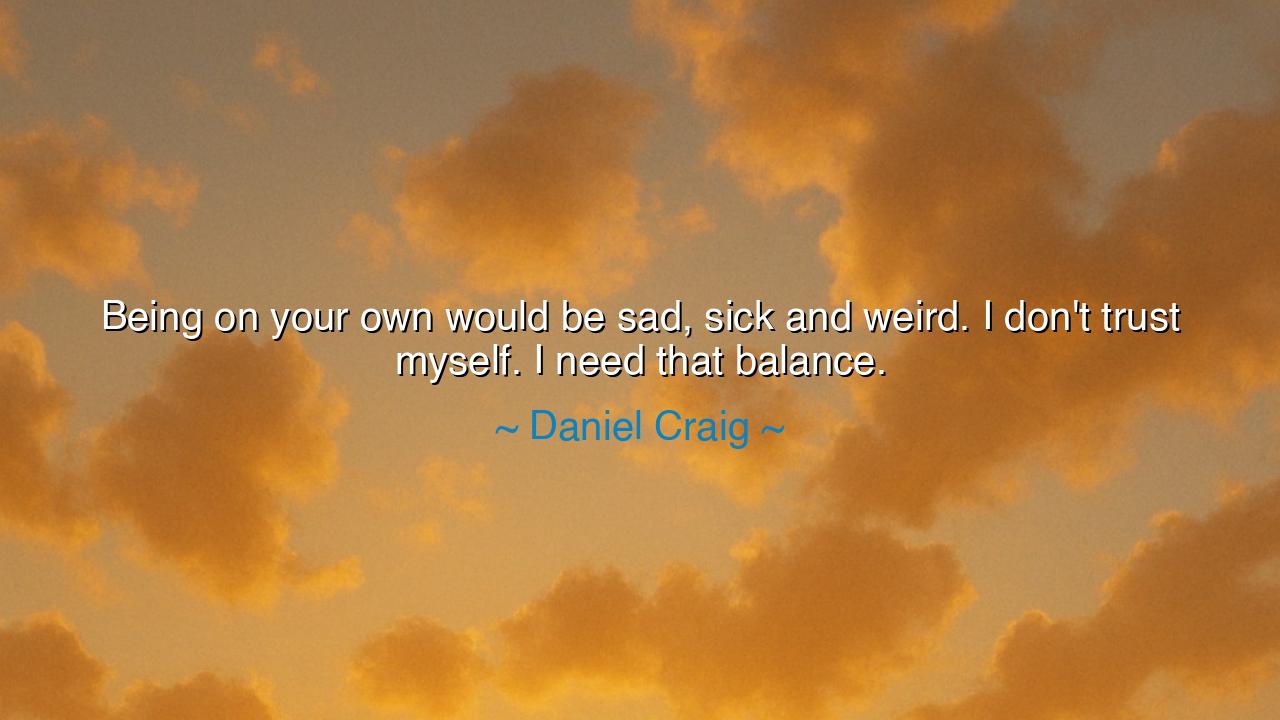
Being on your own would be sad, sick and weird. I don't trust
Being on your own would be sad, sick and weird. I don't trust myself. I need that balance.






There is a deep, disarming honesty in the words of Daniel Craig, who said, “Being on your own would be sad, sick and weird. I don't trust myself. I need that balance.” In this confession, spoken without pretense, lies a truth as old as humankind — that no one is meant to exist in isolation. The actor, known for his stoic portrayals of strength, reveals here the fragile and sacred side of being human: the yearning for connection, for the grounding presence of others that steadies the heart when pride, fear, or loneliness threaten to consume it. His words remind us that even those who appear the strongest often draw their strength from companionship — from love, trust, and shared life.
The origin of this quote arises from Craig’s reflections on marriage and human dependence, on the humbling recognition that greatness is not born from solitude but from balance. Though he played the indomitable James Bond, a man defined by self-reliance and detachment, Craig himself understood that such isolation is not noble — it is tragic. He acknowledges the danger of trusting only the self, of believing that independence means invulnerability. His admission that “I don’t trust myself” is not weakness, but wisdom — the awareness that unchecked solitude can warp perception, that the mind left alone too long begins to circle its own darkness.
The ancients knew this truth well. The philosopher Aristotle declared that man is by nature a social being — and that he who lives alone, needing no one, is either a beast or a god. To seek balance, as Craig does, is to embrace one’s humanity — to recognize the need for the reflection and correction that only another soul can provide. Even the heroes of myth were not alone: Achilles had Patroclus, Odysseus had Penelope, Gilgamesh had Enkidu. Each found in their companion not weakness, but grounding — a mirror that reflected both their light and their limits. Without that bond, their journeys would have descended into madness or ruin. So too does Craig’s reflection echo this timeless principle: that balance is born not from isolation, but from relationship.
Consider the story of Friedrich Nietzsche, the philosopher who famously declared, “I am one who has to write because I am alone.” His solitude gave birth to genius, yes — but it also led him into despair. His mind, unanchored by love or shared life, turned inward upon itself until he was consumed by the very fire he kindled. By contrast, those who sought balance — such as Marcus Aurelius, surrounded by family, duty, and fellowship — found a steadier path through life’s storms. Solitude may sharpen the mind, but companionship preserves the soul. It is this equilibrium that Craig names when he says, “I need that balance.”
There is also humility in his words — the humility to admit, “I don’t trust myself.” In an age that glorifies self-sufficiency, this is a radical truth. The ancients called this humility sophrosyne — the virtue of moderation, the wisdom of knowing one’s own limits. To trust only oneself is to walk blind into arrogance; to invite others into one’s life is to gain perspective, grace, and restraint. The self left unchallenged becomes distorted; but when balanced by love, friendship, and accountability, it becomes whole. This is why Craig speaks of balance, not dependency — for true companionship does not weaken the spirit, it tempers it, like iron forged in the heat of shared living.
And yet, his words also carry an undertone of sorrow: “Being on your own would be sad, sick, and weird.” Here he touches the universal fear — that of loneliness, the slow erosion of purpose when life is lived without witness or warmth. The ancients feared it too, calling exile the harshest punishment short of death. For to be cut off from others is to lose one’s sense of belonging, to drift in a sea of self where no voice but one’s own can be heard. Balance, therefore, is not merely emotional comfort — it is spiritual survival.
The lesson, my children, is profound and enduring: seek balance through connection. Do not believe the lie that strength means standing alone. Even the tallest tree needs roots intertwined with others to weather the storm. Find the people who steady you, who remind you who you are when pride blinds you or despair tempts you. Cherish them as the ancients cherished sacred oaths — for they are your anchors against the chaos of self.
For as Daniel Craig reminds us, solitude without purpose can rot the soul, but balance — the harmony between self and others — gives life its rhythm. To walk alone is to risk falling inward; to walk together is to grow upward. So learn from his humility: do not trust only your own strength. Let others in. Let love, friendship, and fellowship become your compass. For the heart that finds balance between independence and connection has found not just peace — but wisdom.






AAdministratorAdministrator
Welcome, honored guests. Please leave a comment, we will respond soon